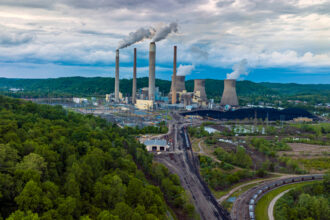PEARSALL, Texas—During their careers as oil and gas inspectors for the Texas Railroad Commission, Fred Wright and Morris Kocurek earned merit raises, promotions and praise from their supervisors.
They went about their jobs—keeping tabs on the conduct of the state’s most important industry—with gusto.
But they may have done their jobs too well for the industry’s taste—and for their own agency’s.
Kocurek and Wright, who worked in different Railroad Commission districts, were fired within months of each other in 2013. Both say their careers were upended by their insistence that oil and gas operators follow rules intended to protect the public and the environment.
The incidents Kocurek and Wright describe offer an inside look at how Texas regulates the oil and gas industry, a subject InsideClimate News and the Center for Public Integrity have been investigating for more than a year and a half.
The investigation has found that the Railroad Commission and its sister agency, the Texas Commission on Environmental Quality, focus more on protecting the industry than the public, an approach tacitly endorsed by the state’s political leaders. The Railroad Commission is controlled by three elected commissioners who, combined, accepted nearly $3 million in campaign contributions from the industry during the 2012 and 2014 election cycles, according to data from the National Institute on Money in State Politics. Gov. Rick Perry collected a little less than $11.5 million in campaign contributions from those in the industry since the 2000 election cycle. The governor-elect, Attorney General Greg Abbott, accepted more than $6.8 million.
Wright’s job with the Railroad Commission was a particularly important one.
The commission issues permits for oil and gas wells, and Wright spent much of his time inspecting newly built wells and determining whether they were safe enough to become operational. Shoddy well construction is considered a primary cause of groundwater contamination at drilling sites. His job also included making sure decommissioned wells were properly plugged with cement, so residual oil and gas didn’t pollute groundwater.
About This Story
Perhaps you noticed: This story, like all the news we publish, is free to read. That’s because Inside Climate News is a 501c3 nonprofit organization. We do not charge a subscription fee, lock our news behind a paywall, or clutter our website with ads. We make our news on climate and the environment freely available to you and anyone who wants it.
That’s not all. We also share our news for free with scores of other media organizations around the country. Many of them can’t afford to do environmental journalism of their own. We’ve built bureaus from coast to coast to report local stories, collaborate with local newsrooms and co-publish articles so that this vital work is shared as widely as possible.
Two of us launched ICN in 2007. Six years later we earned a Pulitzer Prize for National Reporting, and now we run the oldest and largest dedicated climate newsroom in the nation. We tell the story in all its complexity. We hold polluters accountable. We expose environmental injustice. We debunk misinformation. We scrutinize solutions and inspire action.
Donations from readers like you fund every aspect of what we do. If you don’t already, will you support our ongoing work, our reporting on the biggest crisis facing our planet, and help us reach even more readers in more places?
Please take a moment to make a tax-deductible donation. Every one of them makes a difference.
Thank you,









